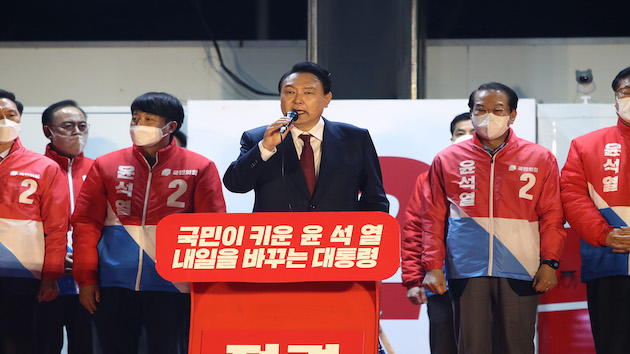(SEOUL, South Korea) — Yoon Suk-yeol, of the conservative People Power Party, won the presidential race in South Korea after a bitter nail-biting vote count overnight. Results show a deeply divided country with 48.56% of ballots going to Yoon, and his rival Lee Jae-myung of the ruling Democratic Party garnering 47.83%.
The race had been marred by negative campaigning plagued by a series of scandals involving corruption, malfeasance and even rumors about wives and a child.
Yoon, set to serve a five-year term, will lead Asia’s fourth-largest economy which has been hit hard by the pandemic, surging home prices and still faces threats from North Korea’s nuclear weapons program. His biggest foreign policy challenge will be to navigate his country stuck in between growing rivalry among two of its biggest trading partners, the U.S. and China.
As president he is likely to revive conservative foreign policies by taking a tougher stance against North Korea centered around a stronger U.S. alliance.
“Peace can only be maintained when there is strong deterrence. A war can only be prevented by securing a preemptive strike capability and showing the will to pursue it. As we have seen in Ukraine, a country’s national security and peace cannot be protected by paper and ink,” he said during a presidential debate last month.
A newcomer into politics, Yoon spent 27 years of his entire career as a prosecutor rising to prominence by prosecuting big political players.
His team of conservative policy specialists will likely advocate a militarily stronger South Korea with heavy investments in national defense. “A sense of national security crisis have heightened in South Korea as North Korea’s nuclear threat intensifies and also especially after Russia invaded Ukraine. Yoon will make a rational decision,” Bong Youngshik of Yonsei Institute for North Korean Studies told ABC News.
Yoon was also open to seeking additional deployment of the U.S. THAAD anti-missile system into his country as deterrence from North Korea’s nuclear threats.
“He will demand North Korea to denuclearize before any negotiations. Instead of pursuing dialogue, Yoon intends to deploy additional units of the U.S. THAAD anti-missile system and strengthen joint South Korea-U.S. military exercises in proportion to North Korea’s missile threats.” Cheong Seong-Chang, researcher at the Seoul-based Sejong Institute, told ABC News.
“Yoon’s government will take a different stance from the Moon administration in dealing with North Korea. He won’t be offering sanctions relief unless North Korea makes significant steps to denuclearize, if there happens to be any.” Shin Beom Chul, director of the Center for Diplomacy and Security at the Korea Research Institute for National Strategy, told ABC News.
ABC News’ Hakyung Kate Lee, Eunseo Nam and Hyerim Lee contributed to this report.
Copyright © 2022, ABC Audio. All rights reserved.












